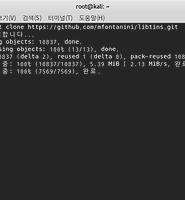| 일 | 월 | 화 | 수 | 목 | 금 | 토 |
|---|---|---|---|---|---|---|
| 1 | 2 | 3 | 4 | 5 | 6 | 7 |
| 8 | 9 | 10 | 11 | 12 | 13 | 14 |
| 15 | 16 | 17 | 18 | 19 | 20 | 21 |
| 22 | 23 | 24 | 25 | 26 | 27 | 28 |
Tags
- 유튜버 김재석
- 미국 금리인하
- 뭉쳐야 찬다
- 김영권 아내
- 이태원 클라쓰 15회 예고
- 불가피
- 제넥신
- 해킹
- 스콜피온킹
- 양적완화
- 김재석
- 성남 코로나 확진자
- 폰폰테스트
- 이지혜
- 금리인하
- 임영규
- 킹덤 고근희
- 조희연
- libtins
- 김영권
- 은혜의 강 교회
- 홍혜걸
- 이상형 만들기
- 최강욱
- 스페인 코로나
- 학교 개학 연기 4월
- 성남은혜의강교회
- 고민정
- 픽크루
- 리리남매
Archives
- Today
- Total
Dork's port
[C++] LibTins를 통한 802.11 Packet Sniff 본문
안녕하세요.
오늘은 LibTins를 통해 암호화된 패킷이 아닌 평문 패킷(OPEN WIFI)에 대한 Sniff 예제를 살펴 보도록 하겠습니다.
#include <iostream>
#include <tins/tins.h>
#include "printdata.h"
using namespace Tins;
using namespace std;
void usage();
bool chkArgc(int argc);
bool foo(PDU& packet)
{
const TCP& tcp = packet.rfind_pdu<TCP>();
// const TCP* tcp1 = packet.find_pdu<TCP>(); reference find
// if(tcp.dport()!=80&&tcp.sport()!=80) return true; //parsing HTTP Packet
cout<<"TCP Source Port : "<<tcp.sport()<<endl;
cout<<"TCP Destination Port : " << tcp.dport()<<endl;
const RawPDU& rawPDU = packet.rfind_pdu<RawPDU>();
if(rawPDU.size()>0){
printByHexData((uint8_t*) rawPDU.payload().data(),rawPDU.size());
cout<<"Payload Size : "<<rawPDU.size()<<endl;
}
return true;
}
int main(int argc, char* argv[])
{
if(!chkArgc(argc))
exit(1);
//init 802.11 Sniffer by Promiscuous Modes
SnifferConfiguration config;
config.set_filter("port 80");
config.set_promisc_mode(true);
Sniffer sniffer(argv[1],config);
sniffer.sniff_loop(&foo);
return 0;
}
void usage()
{
cout<<"Usage : ./IamU <Monitor mode Interface> <Channel>"<<endl;
}
bool chkArgc(int argc)
{
if(argc!=3)
{
usage();
return false;
}
return true;
}
위와 같이 간단하게 패킷 캡처를 진행할 수 있습니다. 암호화된 패킷에 대해서 이전포스팅에 포스팅을 해 두었으니, 필요하신 분은 참조해주시면 됩니다.
감사합니다.
'Develop' 카테고리의 다른 글
| [C++] LibTins를 이용한 AP Scanner (Beacon Sniffer,airodump-ng) (247) | 2017.12.13 |
|---|---|
| [C++] thread invalid use of non-static member function error (0) | 2017.12.09 |
| [C++] LibTins를 통한 802.11 Decrypt(무선패킷 복호화 하기) (0) | 2017.11.30 |
| [C++] 802.11(wireless) 라이브러리 사용하기 (tins Library 사용하기) (0) | 2017.11.20 |
| [C++] MAC Address 저장하기 (0) | 2017.11.02 |
Comments

